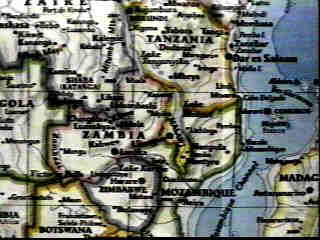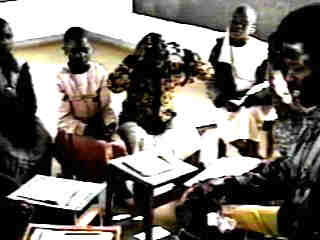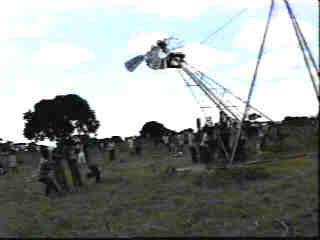



[NOTE: This is the script from a video (Mission to Malawi) prepared by Jim & Carol Nussbaumer after their trip to Malawi in the summer of 1997. The pictures are segments from that video.]
| The first question, of course, is "What are two middle-aged, middle-class, white Anglo-Saxon Protestants doing spending three months in a remote part of the world?" The answer is not so easy, unless you accept -- as we did -- that this was a God-sent call and we had no choice in the matter. Join us now for our Mission to Malawi. | |
| Malawi lies in east-central Africa, south of the equator. A land-locked country, containing the 12th largest lake in the world, Malawi is bounded on the north by Tanzania, on the east and south by Mozambique and on the west by Zambia. |  |
| The village of Embangweni, where we spent three months, lies nearly on the Zambian border in the northern region of Malawi. Even by Malawian standards, Embangweni is remote -- 2 or 3 hours drive on pavement from the nearest town of any size, then 30 kilometers on dirt, after passing a police barricade. | |
| Malawi is the 3rd poorest country in the world, with an annual income of about $150. Because of its small size and population of 9 million, it is one of the most densely populated countries in Africa. Many of the people are subsistence farmers, living in scattered small villages. | |
| Water is still dipped from open, usually stagnant water holes. | |
| Loads of water, wood and grain are carried on womens' heads. | |
| "Up-scale" transportation is an ox-cart. | |
| We found ourselves in Embangweni as a direct result of a mission weekend held in 1995. Following that weekend, it became very clear that God had plans for us in Embangweni. What those plans were, we didn't really know until we arrived and even then there were days when we wondered if this call had been a wrong number | |
| I was asked to use my speech therapy skills at the Embangweni School for Deaf Children. Established in 1995, the school provides housing and education for 42 children ages 6 to 14. Most of them are deaf from birth, with profound hearing losses. | |
| They meet in 4 classrooms, but begin each day together at assembly with prayer, Bible reading and a short sermon. | |
| Facilities are minimal. Each room has stools for the children, a chair for the teacher and child-height blackboards on 2 walls. Books, writing supplies, crayons are nearly non-existent |  |
| I spent each day doing individual speech therapy. With 42 children, there was only time to spend 10 minutes once or twice a week with each child. Despite the language barrier -- they speak ChiTimbuka, I do not, some progress was made. Materials were scarce. The headmaster proudly gave me my supplies; one pencil, one ruler and one piece of chalk. I made flash cards by tearing my business cards into four pieces and writing on the back. I also provided the teaching staff with sign language classes and tutorial sessions for speech therapy after official school hours. | |
| I also put my quilting skills to use, teaching each Friday afternoon at the Nutritional Rehabilitation Unit. Knowing that at least a few kids now sleep more warmly on their bamboo mats is gratifying.When I taught at NRU, I used materials donated by our friends at Mountain View Church and by quilters in Estes Park and Ft. Collins. Each woman who finished a quilt was given it as a gift to take home --- probably one of the few possessions she had. One of my greatest joys was stitching each woman's initials on her quilt as proof it really belonged to her. | |
| Jim felt called to take his various skills and tools to Malawi and there be open to whatever came his way. The "whatever" ranged from helping draw plans for a deaf school addition to driving the hospital vehicle to "town" for supplies. He taught a computer class and helped erect a windmill at one of the outlying health centers. He met daily with the maintenance crew and worked alongside them on many projects. | |
| Because of this, Jim had opportunities to be in outlying villages and to experience first hand the poverty of Malawi. | |
| We quickly learned that Embangweni is not like home! While our residence was very comfortable -- luxurious by Malawian standards -- we still boiled all our drinking water, longed for a really hot shower and wished for non-solar electricity. An almost total lack of outside communication kept us wondering what was going on in the wider world, although we soon found, that like the Malawians, we didn't have time to care about it all that much. | |
| As we watched the people's daily lives, we realized how very well off we in the States are! Malawian women spend their days largely in the production and preparation of food. Early in the morning, wood must be gathered and carried home and fires built. | |
| Then maize which has been previously harvested, dried and pounded is cooked into sima, the staple food. Our western taste buds thought eating sima was a lot like eating Play-Dough. | |
| Throughout the day women pump or dip water and carry it home. If there is any money available, there may be a walk to the market to buy some of the things that can't be or aren't grown at the home. And of course, there are always children to care for. | |
| Although often unemployed except for family farming, the men may hold a job at the hospital or work as semi-skilled laborers. The word labor takes on a whole new meaning in Malawi. Some men and sometimes women, may have a store in the town. Men are generally the tailors, using treadle sewing machines because there is no electricity in Embangweni | |
| Along the shores of Lake Malawi, men fish from dugout canoes just as they have for centuries. | |
| They make and use hand-woven nets. | |
| Grass baskets are used for fishing in shallower waters of the lake. | |
| Christian mission influence has been at work in Malawi for nearly 100 years. First established near the southern tip of Lake Malawi, the missions gradually spread north and inland, attempting to escape the ever-present malaria. In about 1902, Christianity was established at Embangweni. The church building erected then is still in use. The current minister and Head of Station is Rev. Chunga. In addition to preaching the Good News, missionaries brought medical knowledge and today Embangweni is home to a hospital supported in large part by western Presbyterian Churches, including the Presbyterian Church USA |  |
| The Christian influence is noticeable in many places: at daily 7 a.m. chapel on the hospital grounds. Of course not everyone got much out of the sermon which is usually done in Chitimbuka. At the Church on Sunday, services are conducted in English and later in the day in Chitimbuka. | |
| Worship could be found in outlying villages such as Kamsolo, where they have never heard of the "Frozen Chosen" and where it was made evident to them that "white girls don't dance"! Even though I never did get it right, this remains one of my favorite memories of Malawi. | |
| Doctors are sponsored by PCUSA, by the Church of Scotland, the Church of Canada and the Church of Ireland. Serving one to three years terms, these missionary doctors treat diseases such as malaria, t.b., rabies, measles, meningitis, AIDs, and cancer. They deal with malnutrition and struggle to encourage child spacing and pre-natal care, knowing that 80% of births occur at home and that 30% of the children will die before the age of 5. Burns are common, due to open cooking fires. Women who come to the maternity unit are already in a high-risk pregnancy | |
| The doctors do surgery of all kinds and will admit to sometimes more or less following the textbook as they go. Many of the simpler surgeries are done by Malawian medical assistants, who have some training but are not physicians. The operating room has many modern facilities, but it is a far cry from an American O.R. | |
| Unlike U.S. hospitals, the medical staff at Embangweni attends only the medical needs of patients. Meals and personal care are provided by "guardians" -- family members who stay with the patients, living just outside the compound wall, and cooking in this communal kitchen. They do the laundry and keep the patients comfortable in the wards or outside when they are able. | |
| In the Nutritional Rehabilitation Unit, mothers live with their malnourished babies and learn how to provide more nutritious foods for them. The unit raises goats, rabbits and chickens and grows a demonstration garden. When these mothers and children "graduate" from the NRU, they are given vegetable seeds to grow at home and sometimes other "prizes" such as these quilts made by Girl Scouts in Virginia. | |
| Quilts are also given as prizes -- bribes if you will--to mothers of babies who stayed at the hospital until the babies reach a weight of 2 kilograms. | |
| One of the most exciting mission projects at Embangweni is the building of shallow wells. Replacing the typical stagnant water holes with their potential for disease, these wells provide a relatively clean source of water. Villagers dig the well -- usually 10 to 20 feet deep --, line them with locally made brick and form a committee to keep the well area clean. Pumps are built at the hospital; shallow well teams are trained to install and maintain them. Each well costs around $300 and provides water for about 250 people. | |
| Deep bore holes are also drilled to serve larger needs. The hospital clinic at Kalikumbe has such a bore hole, which is now being pumped using a windmill. The windmill was donated by a Nebraska church several years ago; it was finally erected at Kalikumbe. Here again, our church family at Mountain View was a vital part of our mission as they located and shipped essential parts which could not be found in Malawi. |  |
| Our Mission to Malawi was both heart-rending and joyful. The overwhelming poverty, written on the faces of the children and of the aged alike make us think twice about how we will now spend our resources. Simple things like a pair of shoes and the knowledge that there will be food at the market when we go take on new meaning. | |
| And yet the essential feeling in Embangweni was joy! Joy in worship, in singing, in meeting and sharing between Malawian and "msungu". There were always children waiting to meet us and wanting to line up for a photo opportunity. We made many friends despite the language barrier and essential cultural differences. We were honored and humbled by gifts from those who could ill afford them; by prayers given in sincerity and love; by repeated requests to return to Embangweni. | |
| And that we leave in God's hands! |
[NOTE: If you would like to see a copy of this video or arrange for a presentation by Jim & Carol Nussbaumer, contact them at: jim@nussbaumers.net]
Visitors since 12/17/2003